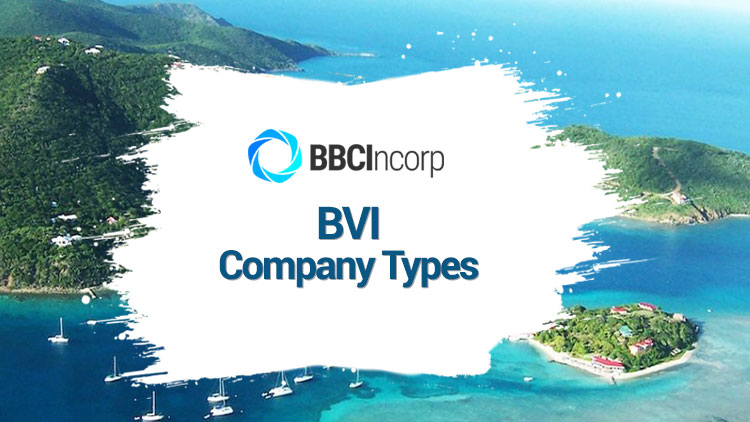
The British Virgin Islands (BVI) is a well-recognized offshore jurisdiction. Entrepreneurs have been flocking to the BVI for their new company incorporation.
The country has a stable economy and a well-functioning government system. Not to mention, it currently houses a burgeoning number of offshore companies.
Companies that are not operating within the country’s borders are not subject to any form of taxation. Another interesting fact is that no currency exchange control is present.
BVI Company Types under BVI Business Companies Act, 2004. Let’s find out!
How many BVI company types do you know?
Under the Business Companies Act of The British Virgin Islands, there are 5 main company types as the following:
- Company limited by shares
- Company limited by guarantee and not authorized to issue shares
- Company limited by guarantee and authorized to issue shares
- Unlimited company authorized to issue shares
- Unlimited company not authorized to issue shares
Other than the above types, the BVI also allows the company registration in further forms of:
- Segregated portfolio company
- Restricted purpose company
Regardless of any type of company in the BVI that you are planning to go to, note that the incorporation of a BVI company must be completed with the Registrar of Company via a registered agent. In addition, the Memorandum of Articles and Articles of Association is a must-have condition. Typically, the memorandum should include the following details:
- The company’s name
- The type of incorporated company
- The address of the company office
- Name and address of the Registered Agent
- Statements of whether the company is allowed to issue shares. If yes, the following details should be carefully prescribed to prevent future misunderstandings. They include the maximum number of shares, the types of shares, how they’ll be managed, etc.
- Other business-related statements such as any limitations on the business that the company may conduct as in the case of a restricted purpose company.
In what follows, we will delve into the key characteristics of each type of company in the BVI. Take a look!
Key features of each BVI company type
Company limited by shares
A company limited by shares is the most common type of company that is registered in the British Virgin Islands.
As its name denotes, a company limited by shares is the company having the ability to issue shares, and its member’s liability is separated from the company’s debts and obligations. Members of this company type are holders of its shares.
In order to incorporate a company limited by shares, you need to ensure your company memorandum of association clearly states that it is a company limited by shares, the maximum number of shares, the classes of shares, and specific features regarding the rights, limitation, and criteria adhering to each class.
Key features for this type of business structure are as the followings:
- Each company limited by shares is required to have at least one shareholder and at least one director, both of whom may be the same person.
- After the appointment of the company’s first director(s), he/she must issue the first shares in the company.
- The registered agent has a period of 6 months from the incorporation of the company to appoint the first director(s), and it is the first director(s) who will issue the first shares in the company.
- Shareholder’s liability is limited to the amount unpaid on shares held.
- Regarding the voting rights, for companies limited by shares, a shareholder has the total number of votes attached to the shares that he/she holds.
Company limited by guarantee
This company type is typically used for non-profit organizations. Under section 5 of the BVI Business Companies Act, a business is allowed to register a company limited by guarantee in two forms:
- A company limited by guarantee that is not authorized to issue shares
- A company limited by guarantee that is authorized to issue shares.
So, what are the differences between them?
A basic thing is that company limited by guarantee, whether or not authorized to issue shares, requires at least 1 member of the company to be a guarantee member. In addition, a guarantee member is entitled to one vote on any resolution on which he or she is entitled to vote unless the memorandum or articles provide otherwise.
Like obligations for the memorandum as seen in any company type, the memorandum submitted to incorporate a company limited by guarantee must be well stated in detail its company type and essence of its guarantee member’s liabilities.
Concerning the liability of a guarantee member to the company, as a guarantee member, it is typically limited to:
- The amount that the guarantee member has the liability to contribute as stated in the memorandum;
- Any other liability expressly provided for in the memorandum or articles of the company; and
- Any liability to repay a distribution in case it did not meet the solvency test.
Again, note that these liabilities would be applied only when the company is put into voluntary liquidation or insolvent liquidation as the laws, and they are limited to an amount described in the memorandum.
The flexibility to issue shares is the key difference of Company limited by guarantee authorized to issue shares compared to that not authorized to issue shares.
You should also recognize that the company limited by guarantee authorized to issue shares is actually a combination of a company limited by guarantee and a company limited by shares. Therefore, in addition to a statement of its company type, the memorandum must also involve further matters for guarantee companies as well as for companies limited by shares. A guarantee member can also be a shareholder.
Unlimited company
If you have got an insight into forms of “limited” company, everything will be easier with the “unlimited” one. The characteristics of each type can be fairly corresponding with what you have learned from its opposite terms.
Whether or not authorized to issue shares, an unlimited company must have a minimum of 1 unlimited member at all times. The liability of the unlimited members is considered to be their responsibility of making a contribution to the company assets in liquidation. Note that these members will have unlimited liability for the company’s liabilities.
Like a company limited by guarantee, there are two main forms of unlimited companies including:
- Unlimited company authorized to issue shares: The company has the ability to issue an unlimited number of shares. Its unlimited member can also be a shareholder and will have one vote unless the memorandum or articles provide otherwise.
- Unlimited company not authorized to issue shares: The company does not issue shares and thus none of its members are shareholders. As per the BVI Business Companies Act, the unlimited company not authorized to issue shares is subject to the requirement of filing its annual return in the approved form of its directors.
Restricted purpose company
A restricted purpose company (normally having its name ending with “(SPV) Limited” or “(SPV) Ltd”) is quite similar to a BVI business company but it may only be registered for transactions and activities with limited purposes such as insolvency-remote issues, securitizations or off-balance-sheet financing work.
There are some specific requirements for those who wish to establish a restricted purpose company in the British Virgin Islands:
- The company must be a company limited by shares;
- The company’s memorandum of association must include a statement that the company is a restricted purposes company;
- The memorandum must also clarify the actual purposes of the company.
It should be noted that a restricted purpose company is prohibited from amending its memorandum to modify or erase the statement for its type of company (that it is a restricted purpose company), as well as any resolution relating to the void of its members or directors.
A restricted purposes company can also be a segregated portfolio company.
Segregated portfolio company
Pursuant to the BVI Business Companies (Amendment) Act, 2018, The British Virgin Islands allows a segregated portfolio company (SPCs) to be incorporated or registered as an existing company only if the company is, or on incorporation will be:
- Licensed as an Insurer under the Insurance Act, 1994;
- Recognized as a professional or private fund or registered as a public fund under the Mutual Funds Act, 1996;
- Not licensed:
- as an investment business company under the Securities and Investment Business Act, 2010;
- as an insurance manager or insurance intermediary under the Insurance Act, 2008;
- to carry on any activity that is regulated under the Banks and Trust Companies Act, 1990, Company Management Act, 1990, or Financing and Money Services Act, 2009.
A BVI SPC is deemed a legal entity that has separate portfolios. The assets and liabilities of each individual portfolio are segregated from each other and from the general assets and liabilities of the company. Notwithstanding, each segregated portfolio is not a separate legal entity.
A BVI business company segregated portfolio, after some amendments on its SPC regime and the expansion of its potential uses, is now able to be served for the following purposes:
- To hold assets for high net worth persons – i.e., institutional investors;
- To run multiple businesses/ types of business, including operating new business ventures that require segregation from the business of the segregated portfolio company;
- To use for property development and management;
- To used for bankruptcy remote vehicles in structured finance and capital markets transactions;
- To perform other responsibilities and investments which are not inconsistent with any restriction under the Act or SPC (BVI Business Company) Regulations, 2018.
To register as a BVI SPC, the entity must satisfy some requirements as below:
- Must be a company limited by shares;
- Either by setting up a new company as an SPC or in case of already incorporated, by registering with the Registrar as an SPC;
- Must receive written approval of the Financial Services Commission of the British Virgin Islands to be incorporated/registered.
Conclusion
In short, the British Virgin Islands (BVI) is one of the most reputed jurisdictions in the world. There are multiple choices for entrepreneurs to incorporate a BVI company, including a company limited by shares which is the most popular company type for business people, a company limited by guarantee, unlimited company, restricted purpose company, and segregated portfolio company.
Despite the fact that BVI company formation can be done in a straightforward and fast process, you should know that only a BVI registered agent has the ability to apply for incorporation. Each type of company also has its own characteristics and incorporation requirements. Therefore, if you are going to establish a company in the BVI, bear in mind to well examine whether the proposed type is the best fit with your company’s demands and goals. You are recommended to seek advice from professional experts before setting up your company.
Should you have any questions on each BVI company type, do not hesitate to send us an email via service@bbcincorp.com, or drop us an online message to live chat with our consultant team for further useful information.
Disclaimer: While BBCIncorp strives to make the information on this website as timely and accurate as possible, the information itself is for reference purposes only. You should not substitute the information provided in this article for competent legal advice. Feel free to contact BBCIncorp’s customer services for advice on your specific cases.
Industry News & Insights
Get helpful tips and info from our newsletter!
Stay in the know and be empowered with our strategic how-tos, resources, and guidelines.





